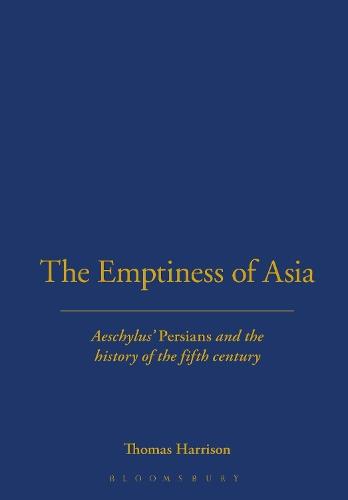Overview
This is a literary study of Aeschylus' Persians alongside Herodotus' Histories, which offers a comprehensive understanding what actually happened at the battle of Salamis and afterwards. Thomas Harrison examines the political and ideological motivating factors underpinning Persai in the context of the times. Aeschylus’ Persians is not only the first surviving Greek drama. It is also the only tragedy to take for its subject historical rather than mythical events: the repulse of the army of Xerxes at Salamis in 480 B.C. It has frequently been mined for information on the tactics of Salamis or the Greeks’ knowledge of Persian names or institutions, but it also has a broader value, one that has not often been realised. What does it tell us about Greek representations of Persia, or of the Athenians’ self-image? What can we glean from it of the politics of early fifth-century Athens, or of the Athenians’ conception of their empire? How, if at all, can such questions be approached without doing violence to the Persians as a drama? What are the implications of the play for the nature of tragedy?
Full Product Details
Author: Dr Thomas Harrison (University of St Andrews, UK)
Publisher: Bloomsbury Publishing PLC
Imprint: Bloomsbury Academic
Dimensions:
Width: 15.40cm
, Height: 1.20cm
, Length: 23.20cm
Weight: 0.300kg
ISBN: 9781350113411
ISBN 10: 1350113417
Pages: 192
Publication Date: 02 May 2019
Audience:
College/higher education
,
Professional and scholarly
,
Tertiary & Higher Education
,
Professional & Vocational
Format: Paperback
Publisher's Status: Active
Availability: Manufactured on demand

We will order this item for you from a manufactured on demand supplier.
Reviews
[This] is a literary study of Aeschylus' Persai alongside Herodotus' Histories which will provide the reader with comprehensive understanding what actually happened at the battle of Salamis and afterwards. A scholarly dissection of political and ideological motivating factors underpinning the Persai in the context of the times, The Emptiness of Asia is a fascinating and thoughtfully insightful analysis -- and a welcome addition to Hellenic Studies reference collections and supplemental reading lists. -- The Midwest Book Review This is a vigorous and captivating book with a mighty sting in its tail. Tom Harrison does what many have done before, he reads Aeschylus’ Persai alongside Herodotus’ Histories. But...he compares them to reveal the commonplaces and assumptions about Persia that shaped not only the writing of the play, but the reactions of the audiences. The powerful account of the play’s political and ideological force that results overturns a century of modern scholarship, unmasking the projections of their own views that literary critics have wished upon the play and questioning our romantic assertion of the uniqueness of classical Athenian culture. -- Robin Osborne
[This] is a literary study of Aeschylus' Persai alongside Herodotus' Histories which will provide the reader with comprehensive understanding what actually happened at the battle of Salamis and afterwards. A scholarly dissection of political and ideological motivating factors underpinning the Persai in the context of the times, The Emptiness of Asia is a fascinating and thoughtfully insightful analysis -- and a welcome addition to Hellenic Studies reference collections and supplemental reading lists. This is a vigorous and captivating book with a mighty sting in its tail. Tom Harrison does what many have done before, he reads Aeschylus' Persai alongside Herodotus' Histories. But...he compares them to reveal the commonplaces and assumptions about Persia that shaped not only the writing of the play, but the reactions of the audiences. The powerful account of the play's political and ideological force that results overturns a century of modern scholarship, unmasking the projections of their own views that literary critics have wished upon the play and questioning our romantic assertion of the uniqueness of classical Athenian culture.
[This] is a literary study of Aeschylus' Persai alongside Herodotus' Histories which will provide the reader with comprehensive understanding what actually happened at the battle of Salamis and afterwards. A scholarly dissection of political and ideological motivating factors underpinning the Persai in the context of the times, The Emptiness of Asia is a fascinating and thoughtfully insightful analysis -- and a welcome addition to Hellenic Studies reference collections and supplemental reading lists. -- The Midwest Book Review This is a vigorous and captivating book with a mighty sting in its tail. Tom Harrison does what many have done before, he reads Aeschylus' Persai alongside Herodotus' Histories. But...he compares them to reveal the commonplaces and assumptions about Persia that shaped not only the writing of the play, but the reactions of the audiences. The powerful account of the play's political and ideological force that results overturns a century of modern scholarship, unmasking the projections of their own views that literary critics have wished upon the play and questioning our romantic assertion of the uniqueness of classical Athenian culture. -- Robin Osborne
Author Information
Thomas Harrison is Professor of Ancient History at the University of St Andrews, UK. His publications include Divinity and History: the religion of Herodotus (2000), and as editor Greeks and Barbarians (2002) and the Edinburgh Companion to Ancient Greece and Rome (2006).




